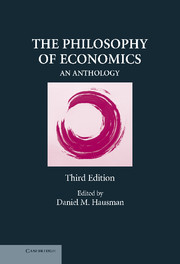Book contents
- Frontmatter
- Contents
- Introduction
- PART ONE CLASSIC DISCUSSIONS
- PART TWO POSITIVIST AND POPPERIAN VIEWS
- PART THREE IDEOLOGY AND NORMATIVE ECONOMICS
- PART FOUR BRANCHES AND SCHOOLS OF ECONOMICS AND THEIR METHODOLOGICAL PROBLEMS
- PART FIVE NEW DIRECTIONS IN ECONOMIC METHODOLOGY
- 22 The Rhetoric of This Economics
- 23 Realism
- 24 What Has Realism Got to Do with It?
- 25 Feminism and Economics
- 26 Credible Worlds: The Status of Theoretical Models in Economics
- Selected Bibliography of Books on Economic Methodology
- Index
- References
22 - The Rhetoric of This Economics
Published online by Cambridge University Press: 05 June 2012
- Frontmatter
- Contents
- Introduction
- PART ONE CLASSIC DISCUSSIONS
- PART TWO POSITIVIST AND POPPERIAN VIEWS
- PART THREE IDEOLOGY AND NORMATIVE ECONOMICS
- PART FOUR BRANCHES AND SCHOOLS OF ECONOMICS AND THEIR METHODOLOGICAL PROBLEMS
- PART FIVE NEW DIRECTIONS IN ECONOMIC METHODOLOGY
- 22 The Rhetoric of This Economics
- 23 Realism
- 24 What Has Realism Got to Do with It?
- 25 Feminism and Economics
- 26 Credible Worlds: The Status of Theoretical Models in Economics
- Selected Bibliography of Books on Economic Methodology
- Index
- References
Summary
Deirdre N. McCloskey (1942–) was educated at Harvard University, taught for many years at the University of Chicago and the University of Iowa, and is currently a UIC Distinguished Professor of Economics, History, English, and Communication at the University of Illinois at Chicago. McCloskey was Donald until 1995. She describes her transition in Crossing: A Memoir. In addition to her long-standing research interests in economic history, in the 1980s McCloskey became interested in the ways in which economists persuade one another, and her work on the rhetoric of economics poses a serious challenge to traditional views of economic methodology. The author of twenty books and three hundred articles, McCloskey has been an extremely influential figure.
In the opening scene of the movie The Graduate a Mr. McGuire puts an avuncular arm around the Dustin Hoffman character and says, “I just want to say one word to you. Just one word.” Yes, sir? “Are you listening?” Yes, I am. “Plastics.” [Pause] Exactly how do you mean it? “There's a great future in plastics. Think about it. Will you think about it?” Yes, I will. “Enough said: that's a deal.”
So nowadays the avuncular word to the wise is “rhetoric.” There's a great future in rhetoric. Furthermore, unlike plastics, rhetoric has also had a great past, the twenty centuries during which it was the educator of the young and the theory of speech in the West – as the classicist Werner Jaeger called it, “the first humanism,” the “rhetorical paideia.”
- Type
- Chapter
- Information
- The Philosophy of EconomicsAn Anthology, pp. 415 - 430Publisher: Cambridge University PressPrint publication year: 2007
References
- 1
- Cited by

